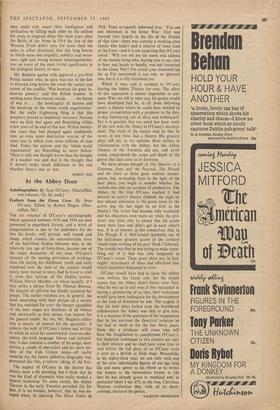At the Abbey Door
THE six volumes of O'Casey's autobiography which appeared between 1939 and 1954 are now presented in paperback format, and a word of congratulation is due to the publishers for the two fat books, well printed, well bound and cheap, which contain the uncomfortable story of the half-blind Dublin labourer who, at the relatively late age of forty-three, became one of the major dramatists of our time. O'Casey's account of the searing privations of working- class life during his childhood, youth and early manhood over the turn of the century would surely have moved to tears,,had he lived to read it, even that scourge of the Dublin worker, William Martin Murphy, on whom happily, if I may strike a phrase from Sir Thomas Browne, the iniquity of oblivion has blindly scattered her poppy. The earlier volumes are, in general, the most interesting with their picture of a society that has vanished for ever; the literary squabbles of the later stages are familiars of all writers and, necessarily as time passes, lose interest for the general reader. So, too, Mr. Hogan's collec- tion is mainly of interest for the specialist : it collects the bulk of O'Casey's letters and articles in which he aired his controversial views on edu- cation, the Irish language, labour and national- ism; it also contains a number of his songs, short stories, a couple of one-aciers and his short his- tory of the Irish Citizen Army—all useful material for the future definitive biography but, presented like this, a tedious raking of old fires.
The neglect of O'Casey in the theatre has always been a bit puzzling, but I think that he was the kind of dramatist who really needed a theatre workshop. To some extent, the Abbey Theatre in the early Twenties provided this for him. It is no wonder, however, that he was en- raged when, in rejecting The Silver Tassie in 1928, Yeats arrogantly informed him: 'You are not interested in the Great War.' That war loomed very largely in the life of the Dublin of that time—there was scarcely a working-class family who hadn't had a relative of some kind at the front—and it is not surprising that O'Casey asked : 'Will you tell me the name and address of the human being who, having eyes to see, ears to hear and hands to handle, was not interested in the Great War? I'm afraid your statement (as far as I'm concerned) is not only an ignorant one, but it is a silly statement too.'
Which it was; and it resulted in O'Casey leaving the Abbey Theatre for ever. The effect of this separation is almost impossible to esti- mate. Who can tell in what way his genius would have developed had he, in all those following years, a theatre where he could have worked in proper co-operation with a producer in the day- to-day hammering out of ideas and techniques? Yet it is possible that too much has been made of the row with the Abbey in O'Casey's develop- ment. The truth of the matter may be that he never, at any time, had a theatre. His greatest plays still are, in my opinion. those written in collaboration with the Abbey; but the Abbey Theatre of the Twenties did not, and never could, comprehend the scope and depth of the genius that had come to its doorstep.
We have always thought of The Shadow of a Gunman, Juno and the Paycock, The Plough and the Stars as three great realistic master- pieces, but, re-reading them in the light of the later plays, you begin to wonder whether the realism was only an accident of production. The Abbey, by the time O'Casey reached it, had become an actor's theatre. (Indeed, the night he was refused admission to the green room by the actors was the last night he set foot in the theatre.) The writer had become only incidental and his objectives even more so; while the pro- ducer was there only to ensure that the actors knew their lines and didn't get in each other's way. It is of interest, in this connection, that, in The Plough, F. J. McCormick (probably one of the half-dozen greatest actors of the century) 'could make nothing of his part' (Jack Clitheroe). The trouble was that he was trying to make some- thing out of it that was only tangential to O'Casey's vision. These great plays are, in fact, mighty movements of ideas and affections into which characters happened to stray.
O'Casey would have had to leave the Abbey even without the Tassie row, for the simple reason that the Abbey didn't know, even then, what he was up to and even if they succeeded in having a glimmering of an idea, their techniques would have been inadequate for his development as the kind of dramatist he was. The tragedy is that his later plays lacked even the bewildered collaboration the Abbey was able to give him; it is a measure of the greatness■of his imagination that he has survived the theatrical isolation he has had to work in for the last thirty years. Some day a producer will come who will have the imagination to complement O'Casey's, but theatrical techniques in this country are only in their infancy and we shall have some time to wait before the full glory of an O'Casey cycle is seen on a British or Irish stage. Meanwhile, in his eighty-third year, we can only wish one of the most indomitable figures of our age long life and more power to his elbow as he writes the Amens to the tremendous hymns to life that he has already given to mankind and, in particular (dare I say it?), to the free, Christian, Western civilisation that, with all its short- comings, nurtured his genius.
VALENTIN IREMONGER


































 Previous page
Previous page